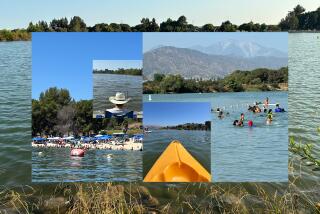Outdoors : Enjoyable Hike, With a Catch : Fishing: One-day trips out of Mammoth Lakes involve stops at six small lakes.
- Share via
MAMMOTH LAKES, Calif. — With the sun in the bluest of blue morning skies, with the scent of pine in the crisp, cool air, David Moss begins his ascent from Coldwater Campground.
He is eager to show off the country near his Mammoth Lakes home and, being a fishing guide, is just as eager to show off his latest gimmick for customers: hiking the Duck Pass trail and catching a wild trout in each of six small lakes in the back country before day’s end.
“I first did it 18 years ago,” says Moss, 58, moments after hitting the rocky trail. “I was a young kid then, by comparison.”
He’s no longer young, nor a kid. But being a runner of marathons, he has the energy and stamina of one. Keeping up with Moss on the two-mile trek up the mountain is a chore.
But even he is no match for the occasional pack trains.
Not three minutes go by before he and Phyllis Benham, a 68-year-old friend and fellow fly-fisher, must yield the narrow trail to a bunch of horses.
As the pack train plods on, Moss picks up his pace, until a movement to his right stops him in his tracks. What appears to be a large cat is bounding down the granite boulders 60 yards away, disappearing before anyone can get a good look.
Moss says it is probably a mountain lion that got wind of the pack animals and came down to investigate.
He decides it is a good idea to move on, uphill through a thick forest of pine.
Suddenly the terrain levels out and Moss and Benham enter a clearing from which the world seems to open up.
The view is incredible: a vast valley beneath a sheer and rocky ridge that stretches for miles and rises thousands of feet. Arrowhead Lake, the last one Moss will hit, is shimmering amid the pines 1,000 feet below.
Benham is breathless, though not so much from the view as from trying to keep up with Moss. “Can I do a little PR here?” she asks. “We have walked roughly 35 minutes at a leisurely pace [leisurely her aching feet!]. And you can take an hour to do this. I used to take women up here on hikes . . . and they couldn’t believe it. Look where you can get in so short a period of time. It’s so beautiful.”
Benham stops talking for a second, then coughs. “Ugh, I just ate a bug,” she says.
Fitting, since the bugs, notably mosquitoes, have been relentless in their effort to eat her alive.
Moss for some reason is oblivious to the bugs, and they don’t seem to show the slightest interest in him.
He does a little PR himself.
“What we have here is a string of lakes going all up the Duck Pass trail, eventually leading up over the top of the pass and down to Duck Lake. We have Arrowhead, Skelton, then lower and upper Woods, and then up Duck Pass trail, we have Barney Lake, which leads into Red Lake.
“So we’re going to head up the trail from here, go behind Skelton, cross the stream and then head up and start the rest of our day. Maybe we can catch a fish out of the stream leading out of Skelton and from another stream up the trail and wind up an eight-bagger.”
Moss finally reaches a stream, which he says is the upper reaches of Mammoth Creek. It is loaded with wild brook trout, small but feisty, he adds.
Though one of Kittredge Sports’ many experienced guides, Moss is overeager and on his first cast, snags his fly in a tree branch.
A little embarrassed, he ties another on and sends it perfectly into the swiftly flowing stream. The fly is inhaled almost immediately and Moss soon has a tiny, beautifully colored brook trout. He releases the fish and it scoots back into the current.
“That’s one,” he says and moves on, over a trail still wet from an overnight thundershower and from melting patches of snow that until late July blanketed the back country, keeping people like Moss below 9,000 feet.
As it is, he only guides this power-hike, catch-a-trout-in-six-lakes trip for two or three groups a year, because most of his customers are serious fly fishermen who prefer the more popular streams in and around town.
“This is for a different crowd,” he says. “You come here for the hike as well as the fishing. The fishing is the bonus and the hike is for the scenery and the exercise.”
Moss reaches lower Woods Lake, a small body of water beneath a towering barren ridge. A duck and her duckling nervously paddle across the lake.
There are no beer cans nor empty bait jars on the shores of the pristine little reservoir, which is home to a healthy population of brook and rainbow trout.
Moss whips his fly through the air and lands it on the surface.
Benham, still walking the shore, steps in a puddle and sinks to her ankle. She pulls her foot out, makes her way to the north end of the lake and makes a few casts of her own.
Moss has already landed a small rainbow and is fighting a brookie. The solitude is incredible, broken only by songbirds and screeching jays.
Having conquered lower Woods, Moss moves on to upper Woods, a larger lake surrounded by trees and boulders. Upper Woods is not as cooperative as lower, however. It is murkier, perhaps from last night’s heavy rain.
Moss casts from a boulder and hooks up twice, losing both fish before getting them within reach. He decides that is better for the fish, anyway, and counts both in his quest to bag a fish in each lake he visits.
Good thing too, because dozens more casts with several flies produce not so much as a rise out of another trout.
Moss reels in and moves on, crossing a small creek, climbing a rocky hillside and stopping briefly to admire two shimmering pools visible between the towering pines.
They are Barney Lake, a large reservoir whose northern shores lie immediately beneath a towering ridge of steep and barren slopes, some still holding patches of snow; and Red Lake, the more inviting of the two, aquamarine in color and sporting what Moss calls “the most beautifully colored rainbow trout” in the region.
Moss makes the short walk up to Barney Lake, a fairly large reservoir near a portion of trail heavily used by hikers on the way to Duck Lake, a huge reservoir frequently visited by backpackers.
Surprisingly, no one is fishing. Everyone but Moss is hiking. And while they are hiking, or merrily sliding down patches of snow on the hillsides, Moss pulls rainbows and brookies from the frigid pools of Barney Lake.
He is four for four but, with the sun still high, he wants another shot at Red Lake before heading down the mountain to Skelton and Arrowhead.
This time, rather than using a floating dry fly, he decides to make a leader and use a sinking fly beneath the dry fly. The strategy pays off. The floating fly acts as a bobber and when it goes under, Moss sets the hook. Moss keeps a tight line and brings in a small brook trout. He admires it for a second, revives it in the water and turns it loose. He bags another, then a rainbow.
It’s 2:45. Moss walks to the edge of the lake and looks out over yet another beautiful valley. A stream is gushing out of Red Lake and cascading down into the valley and, eventually, into Skelton Lake.
Moss and Benham begin their descent, once again giving way to a pack train.
Skelton is another gorgeous reservoir, nestled amid the trees and surrounded by granite boulders and jagged ridges, but the day is taking its toll.
Benham is bothered by the relentless mosquito assault but doesn’t complain, having caught a few fish of her own. Moss spends only a short time at Skelton, landing one fish, before heading farther down the mountain to Arrowhead, a picturesque little lake nestled in a small valley surrounded by pine-covered slopes leading to the high country from where Moss just came.
Benham is unable to lure a trout out of Arrowhead and seems to have had it with the mosquitoes. Moss lands a rainbow and smiles in triumph. It’s time to hit the trail back to town.
More to Read
Sign up for The Wild
We’ll help you find the best places to hike, bike and run, as well as the perfect silent spots for meditation and yoga.
You may occasionally receive promotional content from the Los Angeles Times.






